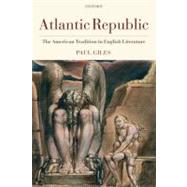
Note: Supplemental materials are not guaranteed with Rental or Used book purchases.
Purchase Benefits
Looking to rent a book? Rent Atlantic Republic The American Tradition in English Literature [ISBN: 9780199567034] for the semester, quarter, and short term or search our site for other textbooks by Giles, Paul. Renting a textbook can save you up to 90% from the cost of buying.
| List of Illustrations | p. xi |
| Introduction: Reformation, Disestablishment, Transnationalism | p. 1 |
| The American Revolution and the Rhetoric of Schism | p. 12 |
| Samuel Johnson and the Loss of America | p. 12 |
| Enlightenment Liberty | p. 21 |
| Transatlantic Romanticism and Parliamentary Reform | p. 31 |
| William Wordsworth, S. T. Coleridge, and the Anglican Order | p. 31 |
| P. B. Shelley, Lord Byron, and the Republican Inheritance | p. 45 |
| Reform as Apocalypse: Mary Shelley and the Novel of Purpose | p. 55 |
| The First Cold War: Anglo-American Literature and the Oregon Question | p. 71 |
| Manifest Destiny and Anglophobia | p. 71 |
| The Land Politics of Transcendentalism | p. 81 |
| English Counterfire | p. 93 |
| Arthur Hugh Clough and the Poetics of Dissent | p. 112 |
| Negative Transcendentalism: The Dialogue with R. W. Emerson | p. 112 |
| Anti-Anglicanism: The Dialogue with Matthew Arnold | p. 122 |
| Aestheticism, Americanization, and Empire | p. 135 |
| The Aesthetic Movement's Transatlantic Horizons | p. 135 |
| The Local and the Global | p. 151 |
| Great Traditions: Modernism, Canonization, Counter-Reformation | p. 171 |
| Spirit Summoned West | p. 171 |
| The Constitution of Silence | p. 186 |
| The Fascist Imaginary: Abstraction, Violence, and the Second World War | p. 201 |
| Arcadia Noir | p. 201 |
| Through the Looking Glass | p. 223 |
| Postwar Poetry and the Purifications of Exile | p. 245 |
| The Just City | p. 245 |
| The Double Image | p. 261 |
| A Gathered Church | p. 270 |
| Postmodernist Fiction and the Inversion of History | p. 286 |
| Perverse Reformations | p. 286 |
| American Ghosts | p. 304 |
| Parallel Universes | p. 315 |
| Global English and the Politics of Traversal | p. 330 |
| The Art of Blasphemy | p. 330 |
| A New World Order | p. 346 |
| Conclusion: The Transnationalization of English Literature | p. 358 |
| Works Cited | p. 365 |
| Index | p. 409 |
| Table of Contents provided by Ingram. All Rights Reserved. |
The New copy of this book will include any supplemental materials advertised. Please check the title of the book to determine if it should include any access cards, study guides, lab manuals, CDs, etc.
The Used, Rental and eBook copies of this book are not guaranteed to include any supplemental materials. Typically, only the book itself is included. This is true even if the title states it includes any access cards, study guides, lab manuals, CDs, etc.